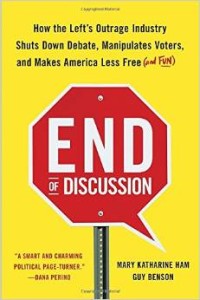As chairman of the annual Western Conservative Summit, I was pleased to invite back for this year's edition our longtime friends and political allies, Mary Katharine Ham and Guy Benson, to talk about their important new book, End of Discussion: How the Left’s Outrage Industry Shuts Down Debate, Manipulates Voters, and Makes America Less Free. Both have spoken at several previous Summits, and Guy has road-tripped to places like Grand Junction CO and Scottsdale AZ on behalf of the Institute’s freedom message. Why the invitation? Because I see timeliness and urgency in Ham and Benson’s defense of the American ideal of open, spirited, civil debate in the public square, and in their case studies of assaults on that ideal by progressives. Their book valuably reinforces our mission at Centennial Institute, as Colorado Christian University’s think tank, to equip citizens "to be seekers of truth [and] to debunk spent ideas” (quoting from the CCU Strategic Objectives).
It is precisely for that reason, because America needs better citizenship and lots of it, that any good citizen with a thoughtful message is always welcome on our speaker platform. We’ve had Marxists, Darwinists, Freudians, Muslims, Jews, atheists, and gays, not in most cases to present a worldview we reject, but to further the discussion on great issues of the day, worldview aside. That open forum, all comers given a hearing, has been and will remain our policy.
Thus when Guy Benson recently stated he is gay — putting it on record for intellectual honesty and putting it in perspective as a mere footnote at the back of his and Mary Katharine Ham’s book — we viewed the disclosure as immaterial to our reasons for having invited the two authors months before. Neither is coming to the Summit to speak on gay marriage or on gayness in any way. They are coming to speak on keeping the public square open. What a surrender if Centennial Institute moved for its closure by suddenly declaring them unwelcome.
We program the Western Conservative Summit by weighing our invited speakers’ capability as advocates and the merits of their civic vision, not by appraising their personal lives. We’re not confident how well any of us could stand such an appraisal ourselves, if the secrets of all hearts were known. Rather, as followers of Jesus and servants of a Christian university, in our dealings with every individual, we want to live out what St. Paul called “the Gospel of God’s grace” (Acts 20:24).
Benson and Ham’s book title calls out one side of the political divide, the Left, for trying to shut down debate and thus make America less free. But neither side is guiltless. Centennial Institute, committed as we are to freedom, faith, and family, will not waver on those core truths as biblically proclaimed. Nor will we yield to anyone’s ad hominem call to end discussion, be it from Left or Right. Let the discussion flourish unafraid, we say. Let truth and error freely contend. We’re certain the truth will prevail.
